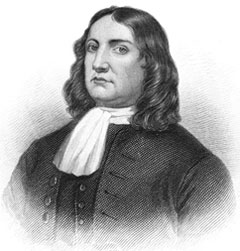
William Penn |
William Penn is known, of course, as the founder of Pennsylvania. He is also known as a famous Quaker and for his "Great Treaty" with the Delaware. To some, his life prior to that time and after, may not be as well known.
His Early Years
William Penn was born in London, England, October 24, 1644, and named after his father, Admiral William Penn. His mother, Margaret Jasper, was a very religious person. That was, no doubt, where he got his deep interest in religion. When he was about twelve years old he had two religious experiences that touched him deeply. One day while alone in his room he suddenly felt the presence of God; on another occasion when in Ireland visiting family property he attended a speech given by Thomas Loe, the Quaker leader, and was moved by what he heard.
As a young man, William's father sent him off to Oxford University where he hoped to have him become a statesman. He was fined and expelled after trouble refusing to attend the Church of England services and instead holding prayer meetings with some of his friends. His very angry father sent him on a vacation to Europe so he could mingle with wealthy young people and perhaps lose some of his interest in religion. For a while it seemed to accomplish that.
However, in his early twenties he returned to Ireland to manage the family estate. Again he met Thomas Loe and was so impressed by the man he himself became a Quaker. William preached and wrote about the Quaker faith and how everyone had the right to worship as they pleased. At the age of twenty four he published his first book called "The Sandy Foundation Shaken". It was deemed a "wicked" book and for this William Penn was imprisoned in the Tower of England. He was warned that he would die in prison unless he gave up his Quaker beliefs. He replied, "My prison shall be my grave before I budge a jot, for I owe my conscience to no mortal man". Admiral Penn begged his friend James, the Duke of York, to arrange for William to be released. James went to his brother, King Charles II, and after spending nine months in the Tower of London, William Penn was freed. It was during this imprisonment he also wrote his most famous book "No Cross, No Crown".
In 1670 he was arrested again for preaching in the London streets about the Quaker faith. His trial was a landmark in the history of English law. It established the rule that jurors must be free from threats by judges. At the trial the judges wanted a "guilty" verdict but the jury found Penn "not guilty". The judges ordered the jurors to go back and find the right verdict. They returned again with a "not guilty". They were fined and jailed but sued the judges and won.
His Pennsylvania Grant
Penn was a wealthy man but lived beyond his means. In need of funds he called in a debt owed Admiral Penn by King Charles II. This amounted to about 16,000 English pounds. He ask the King to grant him land in the territory between Lord Baltimore's province of Maryland and the Duke of York's province of New York. His request was granted. The Charter of Pennsylvania was signed on March 4, 1681, and officially proclaimed on April 2nd. It was named "Penn's Woods" by the King in honor of Admiral Penn. In 1682, the Duke of York deeded Penn his claim to what is now the state of Delaware. William Penn was granted full proprietary rights to Pennsylvania. It was one of the largest land grants given to an individual in the history of the world and with it came enormous political power.
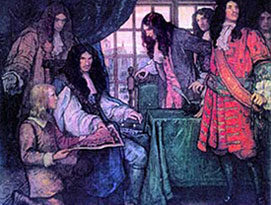 Mural of the charter signing Mural of the charter signing |
|
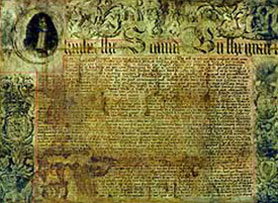 Facsimile of the original charter Facsimile of the original charter |
Penn had two purposes for this undertaking. One was to provide a haven for his fellow Quakers and the other for financial profit by selling tracts of land. He was able to attract a good number of investors but never realized the profit he imagined.
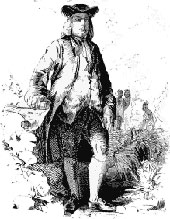 |
Penn wanted the Indians and the colonists to always live together as neighbors and friends insisting they were equals despite differences in lifestyles. He had great respect for them and made effort to win their love and friendship. He chose not to grant or settle any part of the land without first buying the claims of the Indians who lived there. In the Fall of 1681 Penn sent this letter to the Indians. |
My friends - There is one great God and power that hath made the world and all things therein, to whom you and I, and all people owe their being and well-being, and to whom you and I must one day give an account to all that we do in the world; this great God hath written his law in our hearts, by which we are taught and commanded to love and help, and do good to one another, and not to do harm and mischief one to another. Now this great God hath been pleased to make me concerned in your parts of the world, and the king of the country where I live hath given unto me a great province, but I desire to enjoy it with your love and consent, that we may always live together as neighbors and friends, else what would the great God say to us, who hath made us not to devour and destroy one another, but live soberly and kindly together in the world? Now I would have you well observe, that I am very sensible of the unkindness and injustice that hath been too much exercised towards you by the people of these parts of the world, who sought themselves, and to make great advantages by you, rather than be examples of justice and goodness unto you, which I hear hath been matter of trouble to you, and caused great grudgings and animosities, sometimes to the shedding of blood, which hath made God angry; but I am not such a man, as is well known in my own country; I have great love and regard towards you, and I desire to win and gain your love and friendship, by a kind, just, and peaceable life, and the people I send are of the same mind, and shall in all things behave themselves accordingly; and if in any thing any shall offend you or your people, you shall have a full and speedy satisfaction for the same, by an equal number of just men on both sides, that by no means you may have just occasion of being offended against them. I shall shortly come to you myself, at what time we may more largely and freely confer and discourse of these matters. In the meantime, I have sent my commissioners to treat with you about land, and a firm league of peace. Let me desire you to be kind to them and the people, and receive these presents and tokens which I have sent to you, as a testimony of my good will to you, and my resolution to live justly, peaceably, and friendly with you. I am your loving friend.
WILLIAM PENN |
His First Visit to Pennsylvania
Within three months of the signing of the charter Penn had two agencies selling land and had sent his cousin, William Markham, to the new colony to serve as his deputy. In England, he began drawing up the First Frame of Government, his proposed constitution for Pennsylvania. Leaving his wife and children behind to join him later, he arrived in Pennsylvania in October 1682, landing at New Castle in northern Delaware. He immediately set about creating his colony's government and planning the city of Philadelphia. It was during this time he supposedly signed his famous treaty with the Delaware (Leni Lenape) at Shackamaxon. There is some doubt as to whether or not an agreement was ever signed. No copy of a document exists. There is , however, a "wampum belt" allegedly given to Penn at that time. There is a document in existence dated July 15, 1682, in which Penn obtained land from the Idquahon and other Leni Lenape leaders. It is established there were several other transactions purchasing land from the Delaware.
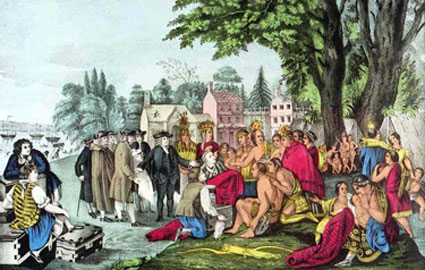
William Penn's "Treaty with the Indians" Lithograph based on work of Benjamin West
 Wampum belt given to William Penn Wampum belt given to William Penn |
Also during this time he began building his mansion (Pennsbury), attended to details of colony building and attempted to settle a border dispute with Lord Baltimore who controlled the territory south of Pennsylvania. He remained in Pennsylvania until late 1684 when he returned to England.
Penn's friend, the former Duke of York, became King James II in 1685. The new King with his harsh policies soon began making enemies. Penn disagreed with the King on many issues but remained loyal to their friendship. When the King's reign ended abruptly in 1688, Penn came under suspicion from the new rulers and for the next six years was either in prison or in hiding.
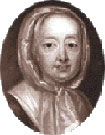 Hannah Penn Hannah Penn |
In 1694 after succeeding in clearing his name, his beloved wife, Gulielma, died after a long illness. He was left to care for three children and with pressing financial problems. Two years later he married Hannah Callowhill, a devout Quaker woman, more than twenty five years younger than himself.
His Second Visit to Pennsylvania
William Penn did not return to Pennsylvania until December 1699. He landed in Philadelphia accompanied by wife, Hannah, and grown daughter, Letitia. He managed to restore order to a colony of chaos. He issued a new constitution, the Charter of Privileges, that provided for legislative assembly and religious freedom. He had hoped to spend his last years peacefully in Pennsylvania settling into his manor, Pennsbury, located up the Delaware from Philadelphia but a need to settle problems with the King over ownership of the colony and other political problems forced him to return to England in November of 1701.
His Later Years
Penn hurried back to England shortly after he signed the Charter of Privileges to put down a movement by Parliament to place Pennsylvania under direct control of the Crown. He was successful in retaining his colony but an associate had defrauded him of a vast amount of money and he was tied up for years in litigation. The stress left him in poor health and in 1712 suffered a severe stroke which him left disabled. He appointed Hannah as Deputy Proprietor and she managed Penn's affairs until his death in 1718. After her death in 1727 the proprietorship of Pennsylvania passed to their sons, John, Thomas, and Richard.
In 1984, by act of Congress, William Penn and Hannah Callowhill Penn were made the third and fourth honorary citizens of the United States. On May 8, 1985, the Penns were granted honorary citizenship of the Commonwealth of Pennsylvania.
|
